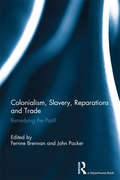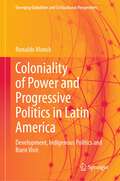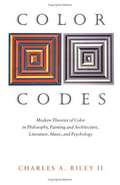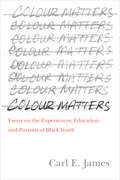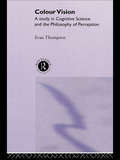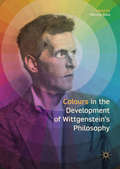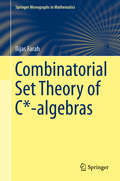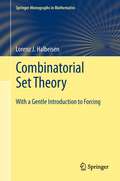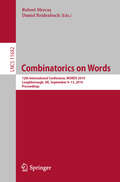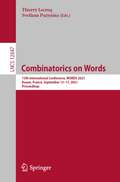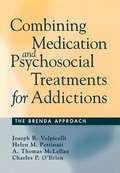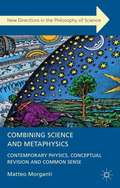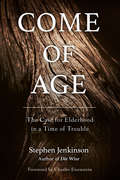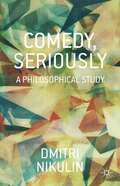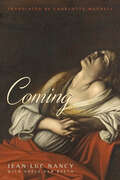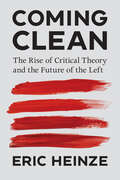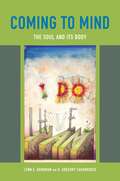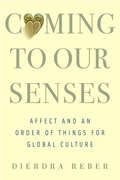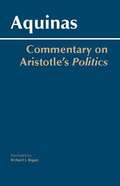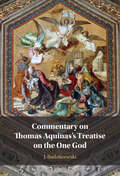- Table View
- List View
Colonialism, Slavery, Reparations and Trade: Remedying the 'Past'?
by Fernne Brennan John PackerColonialism, Slavery, Reparations and Trade: Remedying the ‘Past’? Addresses how reparations might be obtained for the legacy of the Trans Atlantic slave trade. This collection lends weight to the argument that liability is not extinguished on the death of the plaintiffs or perpetrators. Arguing that the impact of the slave trade is continuing and therefore contemporary, it maintains that this trans-generational debt remains, and must be addressed. Bringing together leading scholars, practitioners, diplomats, and activists, Colonialism, Slavery, Reparations and Trade provides a powerful and challenging exploration of the variety of available – legal, relief-type, economic-based and multi-level – strategies, and apparent barriers, to achieving reparations for slavery.
Coloniality of Power and Progressive Politics in Latin America: Development, Indigenous Politics and Buen Vivir (Emerging Globalities and Civilizational Perspectives)
by Ronaldo MunckThis book makes the powerful argument that Latin America needs to be a more central part of the discourse on emerging globalities and in the pursuit of an inter-civilizational focus to avoid West-centric perspectives. It deploys a cultural political economy approach that sees the global political economy as inescapably cultural and allows us to avoid the hyper-rational analysis of economics. It explores various aspects of contemporary Latin America from the revival of dependency theory, the ‘pink tide’ governments since 2000 and, in particular, the potential of the Andean Buen Vivir political philosophy, to offer a distinctive paradigm for sustainable global development.The book provides a de-colonial frame and shows how many recent and new social science perspectives emerging globally are connected with Latin American scholars and Latin American social experiments: namely, dependency, decolonial and post-colonial epistemologies, post-neoliberalism, and the notion ofPluriverse. The book focuses on the cultural, the ethical, the economic and the political, and environmental dimensions of this transformation, which represents a reaction and alternative to the Western cultural, including ethical, economic, political, environmental crises.The readership for this book includes all who are fascinated by the globalization lens on the one hand, and the experience and lessons of Latin America on the other hand.
Color Codes: Modern Theories of Color in Philosophy, Painting and Architecture, Literature, Music and Psychology
by Charles A. Riley IIScholarly Essays on the symbolic use of color in the arts and literature.
Colour Matters: Essays on the Experiences, Education, and Pursuits of Black Youth
by Carl E. JamesBased on research conducted in Black communities, along with over thirty years of teaching experience, Colour Matters presents a collection of essays that engages educators, youth workers, and policymakers to think about the ways in which race shapes the education, aspirations, and achievements of Black Canadians. Informed by the current socio-political Canadian landscape, Colour Matters covers topics relating to the lives of Black youth, with particular, though not exclusive, attention to young Black men in the Greater Toronto Area. The essays reflect the issues and concerns of the past thirty years, and question what has changed and what has remained the same. Each essay is accompanied by an insightful response from a scholar engaging with topics such as immigration, schooling, athletics, mentorship, and police surveillance. With the perspectives of scholars from the United Kingdom, the United States, and Canada, Colour Matters provides provocative narratives of Black experiences that alert us to what more might be said, or said differently, about the social, cultural, educational, political, and occupational worlds of Black youth in Canada. This book probes the ongoing need to understand, in nuanced and complex ways, the marginalization and racialization of Black youth in a time of growing demands for a societal response to anti-Black racism.
Colour Vision: A Study in Cognitive Science and Philosophy of Science (Philosophical Issues in Science)
by Evan ThompsonColour fascinates all of us, and scientists and philosophers have sought to understand the true nature of colour vision for many years. In recent times, investigations into colour vision have been one of the main success stories of cognitive science, for each discipline within the field - neuroscience, psychology, linguistics, computer science and artificial intelligence, and philosophy - has contributed significantly to our understanding of colour. Evan Thompson's book is a major contribution to this interdisciplinary project. Colour Vision provides an accessible review of the current scientific and philosophical discussions of colour vision. Thompson steers a course between the subjective and objective positions on colour, arguing for a relational account. This account develops a novel `ecological' approach to colour vision in cognitive science and the philosophy of perception. It is vital reading for all cognitive scientists and philosophers whose interests touch upon this central area.
Colours in the development of Wittgenstein’s Philosophy
by Marcos SilvaThis book presents and discusses the varying and seminal role which colour plays in the development of Wittgenstein's philosophy. Having once said that "Colours spur us to philosophize", the theme of colour was one to which Wittgenstein returned constantly throughout his career. Ranging from his Notebooks, 1914-1916 and the Tractatus Logico-Philosophicus to the posthumously published Remarks on Colours and On Certainty, this book explores how both his view of philosophical problems generally and his view on colours specifically changed considerably over time. Paying particular attention to his so-called intermediary period, it takes a case-based approach to the presentation of colour in texts from this period, from Some Remarks on Logical Form and Philosophical Remarks to his Big Typescript.
Combating Jihadism: American Hegemony and Interstate Cooperation in the War on Terrorism
by Barak MendelsohnThe book examines how the presence of a hegemonic state affects international cooperation, security, and international relations and argues that winning the war against terror is such state that takes the lead and generates cooperation among states to fight jihad.
Combinatorial Set Theory of C*-algebras (Springer Monographs in Mathematics)
by Ilijas FarahThis book explores and highlights the fertile interaction between logic and operator algebras, which in recent years has led to the resolution of several long-standing open problems on C*-algebras. The interplay between logic and operator algebras (C*-algebras, in particular) is relatively young and the author is at the forefront of this interaction. The deep level of scholarship contained in these pages is evident and opens doors to operator algebraists interested in learning about the set-theoretic methods relevant to their field, as well as to set-theorists interested in expanding their view to the non-commutative realm of operator algebras. Enough background is included from both subjects to make the book a convenient, self-contained source for students. A fair number of the exercises form an integral part of the text. They are chosen to widen and deepen the material from the corresponding chapters. Some other exercises serve as a warmup for the latter chapters.
Combinatorial Set Theory: With a Gentle Introduction to Forcing (Springer Monographs in Mathematics)
by Lorenz J. HalbeisenThis book provides a self-contained introduction to modern set theory and also opens up some more advanced areas of current research in this field. The first part offers an overview of classical set theory wherein the focus lies on the axiom of choice and Ramsey theory. In the second part, the sophisticated technique of forcing, originally developed by Paul Cohen, is explained in great detail. With this technique, one can show that certain statements, like the continuum hypothesis, are neither provable nor disprovable from the axioms of set theory. In the last part, some topics of classical set theory are revisited and further developed in the light of forcing. The notes at the end of each chapter put the results in a historical context, and the numerous related results and the extensive list of references lead the reader to the frontier of research. This book will appeal to all mathematicians interested in the foundations of mathematics, but will be of particular use to graduates in this field.
Combinatorics on Words: 12th International Conference, WORDS 2019, Loughborough, UK, September 9–13, 2019, Proceedings (Lecture Notes in Computer Science #11682)
by Robert Mercaş Daniel ReidenbachThis book constitutes the refereed proceedings of the 12th International Conference on Combinatorics on Words, WORDS 2019, held in Loughborough, UK, in September 2019. The 21 revised full papers presented in this book together with 5 invited talks were carefully reviewed and selected from 34 submissions. WORDS is the main conference series devoted to the mathematical theory of words. In particular, the combinatorial, algebraic and algorithmic aspects of words are emphasized. Motivations may also come from other domains such as theoretical computer science, bioinformatics, digital geometry, symbolic dynamics, numeration systems, text processing, number theory, etc.
Combinatorics on Words: 13th International Conference, WORDS 2021, Rouen, France, September 13–17, 2021, Proceedings (Lecture Notes in Computer Science #12847)
by Thierry Lecroq Svetlana PuzyninaThis book constitutes the refereed proceedings of the 13th International Conference on Combinatorics on Words, WORDS 2021, held virtually in September 2021. The 14 revised full papers presented in this book together with 2 invited talks were carefully reviewed and selected from 18 submissions. WORDS is the main conference series devoted to the mathematical theory of words. In particular, the combinatorial, algebraic and algorithmic aspects of words are emphasized. Motivations may also come from other domains such as theoretical computer science, bioinformatics, digital geometry, symbolic dynamics, numeration systems, text processing, number theory, etc.
Combining Medication and Psychosocial Treatments for Addictions: The BRENDA Approach
by Charles O'Brien Joseph Volpicelli Helen Pettinati A. McLellanRecent studies have shown combined addiction treatments to be more effective than either medication or talk therapy alone. This practical manual presents an empirically supported 6-stage framework for managing biopsychosocial treatment of alcohol and drug dependence. The BRENDA approach helps practitioners integrate emerging and established psychosocial and medical intervention approaches into a comprehensive treatment program that is tailored to the needs of the individual patient. Fully compatible with cognitive-behavioral and 12-step treatment models, BRENDA incorporates the use of newly developed medications, such as naltrexone, that target the biological underpinnings of addiction. The approach has been demonstrated effective in more than 80% of alcohol dependent referrals to the authors' treatment program. Illustrated with extended case examples, the manual describes how to conduct a thorough evaluation and assessment, select appropriate interventions, enhance the patient's motivation to change, coordinate service delivery with other providers as needed, and maximize treatment compliance. Appendices include samples of substance abuse screening instruments and information about naltrexone pharmacotherapy.
Combining Science And Metaphysics
by Matteo MorgantiOffering a new perspective on the debate concerning naturalism in philosophy, this book defends the autonomy of metaphysics while also making science centre stage. Three independent case studies provide a clear introduction to, and discussion of, key philosophical issues.
Come and Take It: The Gun Printer's Guide to Thinking Free
by Cody WilsonCody Wilson, a self-described crypto-anarchist and rogue thinker, combines the controversial yet thrilling story of the production of the first ever 3D printable gun with a startling philosophical manifesto that gets to the heart of the twenty-first century debate over the freedom of information and ideas.Reminiscent of the classic Steal This Book by Abbie Hoffman, Cody Wilson has written a unique, critical, and philosophical guide through the digital revolution. Deflecting interference from the State Department and the Bureau of Alcohol, Tobacco, Firearms and Explosives, the story of Defense Distributed--where Wilson's employees work against all odds to defend liberty and the right to access arms through the production of 3D printed firearms--takes us across continents, into dusty warehouses and high rise condominiums, through television studios, to the Texas desert, and beyond. Harkening to both Zen and the Art of Motorcycle Maintenance and The Anarchist Cookbook, Come and Take It follows a group of digital radicals as they navigate political subterfuge to create a technological miracle, against all odds. Combining elements of a modern-day thriller with a fascinating philosophical treatise, Wilson paints a scathing and timely portrait of an ideologically polarized America and his own struggle in the fight for liberty.
Come of Age: The Case for Elderhood in a Time of Trouble
by Charles Eisenstein Stephen JenkinsonIn his landmark provocative style, Stephen Jenkinson makes the case that we must birth a new generation of elders, one poised and willing to be true stewards of the planet and its species.Come of Age does not offer tips on how to be a better senior citizen or how to be kinder to our elders. Rather, with lyrical prose and incisive insight, Stephen Jenkinson explores the great paradox of elderhood in North America: how we are awash in the aged and yet somehow lacking in wisdom; how we relegate senior citizens to the corner of the house while simultaneously heralding them as sage elders simply by virtue of their age. Our own unreconciled relationship with what it means to be an elder has yielded a culture nearly bereft of them. Meanwhile, the planet boils, and the younger generation boils with anger over being left an environment and sociopolitical landscape deeply scarred and broken. Taking on the sacred cow of the family, Jenkinson argues that elderhood is a function rather than an identity—it is not a position earned simply by the number of years on the planet or the title “parent” or “grandparent.” As with his seminal book Die Wise, Jenkinson interweaves rich personal stories with iconoclastic observations that will leave readers radically rethinking their concept of what it takes to be an elder and the risks of doing otherwise. Part critique, part call to action, Come of Age is a love song inviting us—imploring us—to elderhood in this time of trouble. That time is now. We’re an hour before dawn, and first light will show the carnage, or the courage, we bequeath to the generations to come.
Comedy, Seriously
by Dmitri NikulinComedy, Seriously provides a philosophical interpretation of comedy and argues that comedy displays a particular kind of rationality that reflects philosophical thinking. In particular, that comedy is defined not so much by laughter or jokes, but rather the structure of its plot, which is isomorphic with that of the philosophical argument. Comedy allows for the resolution of a conflict and the achievement of well-being and equality through action that follows the comic plot. Moreover, such action is propelled by the 'thinker on stage, ' who, as socially and politically oppressed, contributes to the liberation of all and the achievement of the good life. Comedy, therefore, establishes the universal pattern for justice and well-being and allows us to rethink the notion of subjectivity not as the modern isolated subject, but rather as integrated with others through shared action and dialogical involvement.
Coming
by Jean-Luc NancyComing is a lyrical, erudite examination of the French notion of jouissance. How did jouissance evolve from referring to the pleasure of possessing a material thing (property, wealth) to the pleasure of orgasm, from appropriation to dis-appropriation, from consumption to consummation? The philosophers Adèle van Reeth and Jean-Luc Nancy engage in a lively dialogue, ranging from consumerism to video games to mysticism and from Spinoza, Hegel, andAugustine to the Marquis de Sade, Marguerite Duras, and Henry Miller. Four additional essays are new to the American edition.
Coming Clean: The Rise of Critical Theory and the Future of the Left
by Eric HeinzeWhat has gone wrong with the left—and what leftists must do if they want to change politics, ethics, and minds.Leftists have long taught that people in the West must take responsibility for centuries of classism, racism, colonialism, patriarchy, and other gross injustices. Of course, right-wingers constantly ridicule this claim for its “wokeness.” In Coming Clean, Eric Heinze rejects the idea that we should be less woke. In fact, we need more wokeness, but of a new kind. Yes, we must teach about these bleak pasts, but we must also educate the public about the left’s own support for regimes that damaged and destroyed millions of lives for over a century—Stalin in the Soviet Union, Mao Zedong in China, Pol Pot in Cambodia, or the Kim dynasty in North Korea. Criticisms of Western wrongdoing are certainly important, yet Heinze explains that leftists have rarely engaged in the kinds of open and public self-scrutiny that they demand from others. Citing examples as different as the Ukraine war, LGBTQ+ people in Cuba, the concept of “hatred,” and the problem of leftwing antisemitism, Heinze explains why and how the left must change its memory politics if it is to claim any ethical high ground.
Coming for Money: A Novel of International Finance
by F.W. vom ScheidtHow much money is too much? And how fast is too fast in life? Investment star Paris Smith steps onto the top rungs of the corporate ladder, only to discover he is caught between his need for fulfillment and his need for understanding, between his drive for power and his inability to cope with his growing emptiness where there was once love. When his wife disappears from the core of his life, Smith’s loneliness and sense of disconnection threaten to overwhelm him. When he tries to compensate by losing himself in his work, he stumbles off the treadmill of his own success, and is entangled in the web of a fraudulent bond deal that threatens to derail his career and his life. Forced to put his personal life on hold while he travels non-stop between Toronto, Singapore, and Bangkok to salvage his career, the embattled financier is deprived of the time and space he needs to mourn the absence of his wife and to objectively assess his future options. In the heat, turmoil and fast money of Southeast Asia half a world from home and half a life from his last remembered smile Paris Smith finds duplicity, comradeship, and power. He also finds a special woman who might heal his heart. The gripping tale is told by a talented new author, F.W. vom Scheidt, who has confidently crafted a fast-paced, highly readable novel. His details are fascinating. His characters are real and not easily forgotten.
Coming to Mind: The Soul and Its Body
by Lenn E. Goodman D. Gregory CaramencioHow should we speak of bodies and souls? In Coming to Mind, Lenn E. Goodman and D. Gregory Caramenico pick their way through the minefields of materialist reductionism to present the soul not as the brain’s rival but as its partner. What acts, they argue, is what is real. The soul is not an ethereal wisp but a lively subject, emergent from the body but inadequately described in its terms. Rooted in some of the richest philosophical and intellectual traditions of Western and Eastern philosophy, psychology, literature, and the arts and the latest findings of cognitive psychology and brain science—Coming to Mind is a subtle manifesto of a new humanism and an outstanding contribution to our understanding of the human person. Drawing on new and classical understandings of perception, consciousness, memory, agency, and creativity, Goodman and Caramenico frame a convincing argument for a dynamic and integrated self capable of language, thought, discovery, caring, and love.
Coming to Our Senses
by Dierdra ReberComing to Our Senses positions affect, or feeling, as our new cultural compass, ordering the parameters and possibilities of what can be known. From Facebook "likes" to Coca-Cola "loves," from "emotional intelligence" in business to "emotional contagion" in social media, affect has become the primary catalyst of global culture, displacing reason as the dominant force guiding global culture. Through examples of feeling in the books, film, music, advertising, cultural criticism, and political discourse of the United States and Latin America, Reber shows how affect encourages the public to "reason" on the strength of sentiment alone. Well-being, represented by happiness and health, and ill-being, embodied by unhappiness and disease, form the two poles of our social judgment, whether in affirmation or critique. We must then re-envision contemporary politics as operating at the level of the feeling body, so we can better understand the physiological and epistemological conditions affirming our cultural status quo and contestatory strategies for emancipation.
Coming to Our Senses: Affect and an Order of Things for Global Culture
by Dierdra ReberComing to Our Senses positions affect, or feeling, as our new cultural compass, ordering the parameters and possibilities of what can be known. From Facebook "likes" to Coca-Cola "loves," from "emotional intelligence" in business to "emotional contagion" in social media, affect has displaced reason as the primary catalyst of global culture.Through examples of feeling in the books, film, music, advertising, cultural criticism, and political discourse of the United States and Latin America, Reber shows how affect encourages the public to "reason" on the strength of sentiment alone. Well-being, represented by happiness and health, and ill-being, embodied by unhappiness and disease, form the two poles of our social judgment, whether in affirmation or critique. We must then reenvision contemporary politics as operating at the level of the feeling body, so we can better understand the physiological and epistemological conditions affirming our cultural status quo and contestatory strategies for emancipation.
Commentary on Aristotle's Politics
by Thomas Aquinas Richard J. ReganOffering the first complete translation into modern English of Aquinas' unfinished commentary on Aristotle's Politics, this translation follows the definitive Leonine text of Aquinas and reproduces in English those passages of William of Moerbeke's exacting yet elliptical translation of the Politics from which Aquinas worked. Bekker numbers have been added to passages from the Politics for easy reference. Students of the history of political thought will welcome this study of a great classic, a commentary by a student of Aristotle who is also a great political theorist in his own right.
Commentary on Thomas Aquinas's Treatise on Happiness and Ultimate Purpose
by J. BudziszewskiThis monumental, line-by-line commentary makes Thomas Aquinas's classic Treatise on Happiness and Ultimate Purpose accessible to all readers. Budziszewski illuminates arguments that even specialists find challenging: What is happiness? Is it something that we have, feel, or do? Does it lie in such things as wealth, power, fame, having friends, or knowing God? Can it actually be attained? This book's luminous prose makes Aquinas's treatise transparent, bringing to light profound underlying issues concerning knowledge, meaning, human psychology, and even the nature of reality.
Commentary on Thomas Aquinas's Treatise on the One God
by J. BudziszewskiThomas Aquinas's classic Treatise on the One God is one of the greatest works ever written in the history of philosophy and theology. During the first half of the twentieth century, philosophy of religion was widely viewed as dead, not even a domain of serious questions but only of 'pseudo-questions.' Surprisingly, not only did the supposed corpse rise from the dead, but religion once again became one of the most active fields of philosophical investigation. The time could not be more fitting for a reinvestigation of Treatise on the One God, which opens the massive Summa theologiae. In this unparalleled exploration of the Treatise's penetrating arguments J. Budziszewski explores and illuminates the text with a luminous line-by-line commentary. Supplemented with thematic discussions, this book discusses not only the Treatise itself, but also its immediate relevance to contemporary thought and issues of the modern world. This work fittingly closes the author's series of commentaries on the Summa Theologiae.
